Related Research Articles

Abdurrahman Wahid, colloquially known as Gus Dur, was an Indonesian Muslim religious and political leader who served as the fourth president of Indonesia from 1999 to 2001. The long-time president of the Nahdlatul Ulama and the founder of the National Awakening Party (PKB), Wahid was the first elected president of Indonesia after the resignation of Suharto in 1998.

The United Development Party is an Islam-based political party in Indonesia. Due to its distinctive logo, the party is known as the "Kaaba Party".
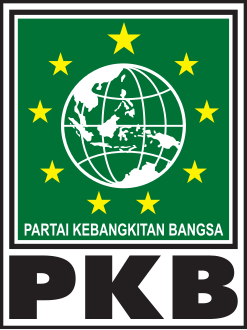
The National Awakening Party, frequently abbreviated to PKB, is an Islam-based political party in Indonesia.

The first direct presidential election in Indonesia was held in two rounds on 5 July and 20 September 2004. Before a 2002 amendment to the Constitution of Indonesia, the President and Vice President were elected by the country's top legislative body, the People's Consultative Assembly (MPR).

Nahdlatul Ulama is a traditionalist Sunni Islam movement in Indonesia following the Shafi'i school of jurisprudence. NU was established on January 31, 1926 in Surabaya as a response to the rise of Wahabism in Saudi Arabia and Islamic modernism in Indonesia. The NU is the largest independent Islamic organization in the world with membership estimates ranging from 40 million (2013) to over 90 million (2019). NU also is a charitable body funding schools and hospitals as well as organizing communities to help alleviate poverty.

Elections in Indonesia have taken place since 1955 to elect a legislature. At a national level, Indonesian people did not elect a head of state – the president – until 2004. Since then, the president is elected for a five-year term, as are the 575-member People's Representative Council, the 136-seat Regional Representative Council, in addition to provincial and municipal legislative councils.

The Masyumi Party was a major Islamic political party in Indonesia during the Liberal Democracy Era in Indonesia. It was banned in 1960 by President Sukarno for supporting the PRRI rebellion.

Legislative elections were held in Indonesia on 3 July 1971, the first under the New Order regime. There were ten participants; nine political parties and the "functional group" Golkar.
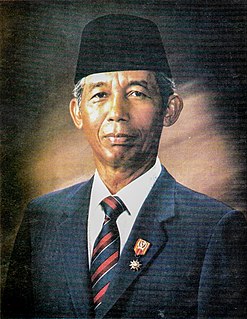
Indonesia's fifth legislative election, and the fourth under the New Order government, was held on 23 April 1987. There were three participants; the two political parties and the "functional group" Golkar. Like all the New Order elections, it was an outright victory for Golkar.
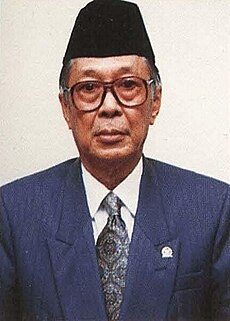
Indonesia's sixth legislative election, and the fifth under the New Order regime, was held on 9 June 1992. Although the share of the vote won by Golkar declined, and the two parties saw their votes rise, the government organisation still won a clear majority.

Islam Nusantara or Indonesian (Islamic) model is a distinctive brand of Islam developed in Nusantara at least since the 16th century, as a result of interaction, contextualization, indigenization, interpretation and vernacularization of universal Islamic values, according to socio-cultural reality of Indonesia. The term was first officially coined, proposed and promoted by Indonesian Islamic organization Nahdlatul Ulama in 2015, as an alternative for interpretation and representation of global Islam that currently dominated by Arabic or Middle Eastern perspectives.
Zainuddin Muhammad Zein, also colloquially known as Zainuddin M.Z., was an Indonesian Islamic preacher, da'i, and politician. He was nicknamed as Dai Sejuta Umat due to his sheer popularity among the Indonesian society. He entered politics later in his career, first serving as an administrator of the United Development Party (PPP), and later the chairman of the Reform Star Party (PBR).
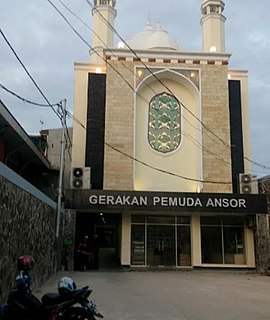
Ansor Youth Movement, often abbreviated as GP Ansor, is a non-profit Islamic youth organization based in Indonesia, affiliated with Nahdlatul Ulama (NU), the largest Islamic mass organization in the world. Founded on April 24, 1934, GP Ansor has maintained a significant role throughout the history of Indonesia, and it has developed its characteristics as traditionalist Islamic, populist, and nationalist. It has grown so far into 433 branches on the municipal and regent level, under the coordination by 32 district managers from provincial down to the village level. This is also coupled with the management of the multipurpose military wing Banser, which requires the special membership to join.
Multipurpose Ansor Front, better known as Banser, is an Islamic militia organization based in Indonesia. It is a military wing of the youth organization Ansor Youth Movement affiliated with Nahdlatul Ulama (NU), the largest Islamic mass organization in the world. Banser operates as a semi-autonomous body of GP Ansor and mainly serves for the security and humanitarian operations. Combined personnel of Banser doubles the number for the Indonesian National Armed Forces (TNI), making Banser a political heavyweight which holds the key to the national stability. Throughout the history, Banser had played major roles especially in issues related to religion, from the active participation in Indonesian mass killings of 1965–1966 against the perceived members of Indonesian Communist Party, to the more recent development of standoff against Hizbut Tahrir Indonesia. In terms of political orientation, Banser, along with GP Ansor, is characterized by traditionalist Islam, populism and nationalism.
In July 2005, Indonesian Ulema Council (MUI), a semi-official Islamic clerical body of Indonesia, issued a fatwa, or an Islamic legal opinion, against religious pluralism, liberalism, and secularism. The issuance of fatwa garnered substantial controversy and scholarly attention. The fatwa addressed the reformist trend of Islam which had been popular among the broad Indonesian society over the past 25 years. Such trends advocated for a more substantive reading of the Quran and Hadith, instead of literalist approaches taken by the majority of ulamas. MUI considered such ideas as incompatible with Islamic teaching, releasing the fatwa to promote a more literal reading of the Islamic scriptures. The fatwa was heavily criticized by progressive Muslim intellectuals.
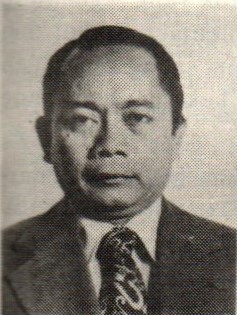
Jailani "John" Naro, also known as Haji Naro or John Naro was a former prosecutor that became an Indonesian politician.
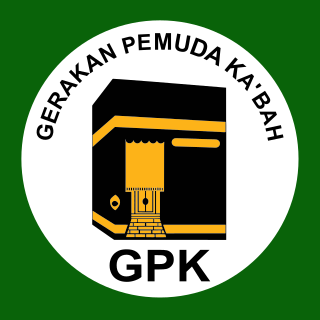
The Kaaba Youth Movement, abbreviated as GPK, is the youth wing of United Development Party (PPP). The movement is one of the three youth wings of the party, the other being Kaaba Youth Forces and the Young Generation of Indonesian Development. The movement was frequently used by the officials of the United Development Party as unofficial bodyguards for them and their family.

Ismail Hasan Metareum is a politician from the United Development Party. He became the party's chairman from 1989 until 1998. He was also the vice chairman of the People's Representative Council from 1997 until 1999.
References
- ↑ Al-Barbasy, Ma'mun Murod (2 June 2014). "Jokowi dan Islam Indonesia". www.republika.co.id. Republika. Retrieved 12 June 2019.
- ↑ Bruinessen 1994 , p. 108
- ↑ Sumbogo, Priyono B. (15 June 1991). "Antara Ranjang dan Keinginan" [Between Beds and Desires]. Tempo (in Indonesian). No. 16. Jakarta. p. 25.
Bibliography
- Bruinessen, Martin van (1994), NU: Tradisi, Relasi-relasi Kuasa, Pencarian Wacana Baru[NU: Traditions, Power Relations, The Search for a New Discourse] (in Indonesian), Yogyakarta: LKiS Yogyakarta and Pustaka Pelajar, ISBN 9789798966033
| This organization-related article is a stub. You can help Wikipedia by expanding it. |